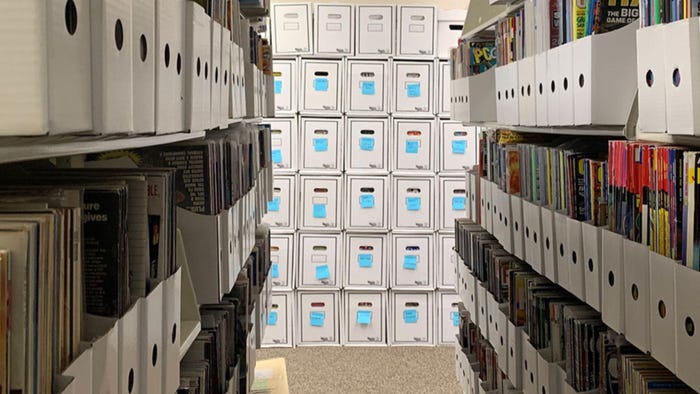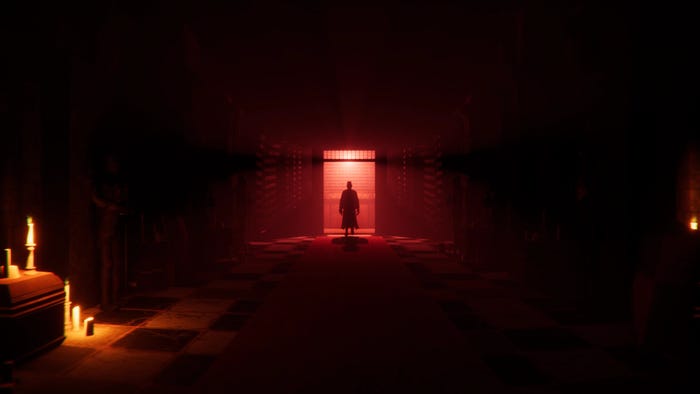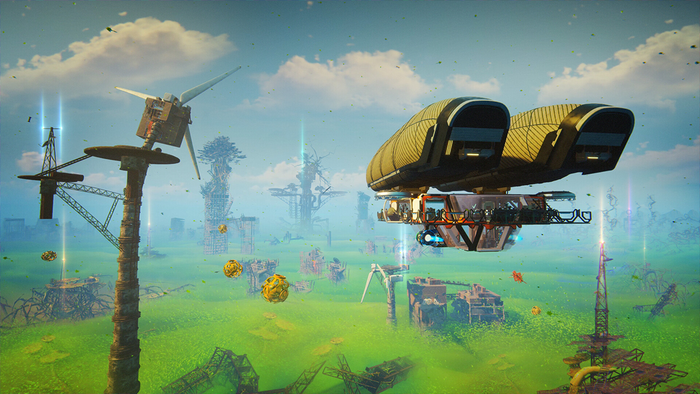Video game HR veteran Marc Mencher has compiled a list of tips and tricks to help you make the most of the game industry networking opportunities available at this year's Game Developers Conference in San Jose, CA.

| ||
The Game Developers Conference is a great place to get your name out there. |
Sure, you can show up at the Game Developers Conference and wander around aimlessly like you did last year and the year before. But how about trying something new this time? Instead of making bar memories that you may or may not remember the next day, why not resolve to network, to reconnect with old and meet new industry colleagues and clients, to really get something out of GDC time? Maybe even a lead to a more fulfilling job? Wow, what a concept!
You've got just a few days -- from March 20-24 -- to be all that you can be (as they say in the Army promos), to take advantage of the key opportunities the conference has to offer … from exploring the San Jose Convention Center show floor, to rubbing elbows with successful developers at the Game Developers Choice Awards, to meeting people who might play a significant role in helping you land your dream job or build your business.
But before you head out, get your act together. Think about how you're going to best showcase your abilities … and how you're going to use my 12 tips and tricks to make it all happen:
#1. Talk It Up!
It doesn't matter who you're talking to -- as long as you're talking. To make the most of a networking event like GDC, you need to spend 75% of your time with people you don't know. If you find yourself talking to the same people over and over again in between sessions, walk away from that group, go get a drink, and say something to a stranger in the line. Force yourself to meet new people. Head outside to the smoking section. Even if you don't smoke. While they may have long-term health problems in common, you'll generally find a diverse and very interesting cross-section of people there.
#2. Did You Hear What I Said?
Yes, you should be talking, but listening is just as important. Give others the opportunity to speak -- and even boast. Show interest. Pay attention. Keep in mind that your goal is to gain and exchange information. You can solicit the information you want by talking and directing the conversation, but then you need to listen.
#3. Keep It Short & Sweet!
Keep the conversation brief or people will lose interest. This is where a 60-second nutshell description of what you do or what your goals are comes in handy. If you're at GDC hoping to make contacts to further your career as a game artist, come up with a succinct “elevator pitch” (short enough to deliver during an elevator ride) that will tell people everything important that they need to know about you.
#4. Stifle Yourself!
Keeping it short and sweet also means that you need to use a filter. In her classic opinion piece entitled “Use A Filter: Why You Should Not Express Every Last Thought That Pops In Your Head To People You Really Don't Know,” marketing maven Beverly Cambron of Rocco Media explains:
“...the truth is this is a small industry. It may be big money-wise, but there is still very much an ‘it's a small world after all' atmosphere. Many in the industry consider the Game Developers Conference something akin to a high school reunion, so unless you're well-acquainted with the person you're talking to, don't badmouth someone else...”
Always keep in mind the good advice from Thumper's mom: “If you can't say anything nice, don't say anything at all.” Keep your snide remarks about certain games or people to yourself. You never know who's standing in line behind you.
#5. Start Preparing NOW!
It's natural to feel uncomfortable socializing with strangers, so preparing yourself ahead of time with a couple of topics for conversation will ease that discomfort. Brush up on industry trends and world news. Check out the industry-related Web sites -- such as this one -- to become current on game development issues. You should know the top-selling games for the last quarter and for the year. If you can't think of an opening line when approaching people, how about just asking if they've had the opportunity to play the latest buzzed-about game? That'll get the conversation flowing.
#6. Do Your Research!
Target six industry people you intend to meet and to develop a connection with beyond a brief networking introduction. A good opportunity will be during the sessions. For example, you know that Andy Artist, who worked on your favorite game by Groovy Games, is leading a roundtable on world building in Maya. You want to work for Groovy Games. Andy would be a good target for you. Research him. Who is this guy? What other games did he create? Where else did he work? Has he written any articles? Prepare to try and speak with him one-on-one before or after the roundtable.
#7. Set Some Goals!
Decide how many new contacts you want to make before specific GDC events and be aware of your time. Spending too long with any one person defeats the purpose of networking. Your objective is to take advantage of the entire room. If you limit yourself to 2-3 minutes per prospect, that gives you a possible 15-20 contacts per hour. But if you give each person 10 minutes, you're down to only six contacts. When you're in a room full of prospects, every minute counts!
#8. Stock Up On Business Cards!
Bring a good supply and, more importantly, hand them out. Even if you're not currently working, you can create your own clever personal business cards. Start a personal Web site and get an e-mail address that you will keep for the rest of your life. Put every conceivable way of contacting you on your business card.
#9. Take A Note!
Write notes on the back of the other person's business card or in a small, pocket-size notebook that you carry with you for easy note-taking. If you can't take notes during the conversation, then jot down whatever you can recall from your chat immediately after you leave. Don't expect to remember it all at the end of the day in your hotel room; you won't.
#10. Take Names!
When networking, the most important information you want from people is the names of other people you can contact. If you're looking for a job, never, ever ask for that job unless the person with whom you're networking brings up the subject. Asking someone for employment is an immediate turn-off. Instead, your focus should be on gathering information to help tailor your resume presentation, accumulating insider information and opinions, and finding mentors. The time for directly asking for a job or for job advice occurs after a networking event and after you have established an ongoing relationship. So don't sweat over the prospect of having to ask for a job at GDC; just think of yourself as a focused socializer.
#11. What's Your Assessment?
After GDC is over, sit yourself down and evaluate your performance. How many business cards did you hand out? How many did you get? What did you do that worked for you? What did you do that didn't? Can you think of another way to increase your effectiveness next time? Recognize that there is more to networking than greeting people. Develop a step-by-step plan for how you'll build relationships and how you can effectively tell your story at the next event. Remember that there's always a next time.
#12. The Key To The Networking Process!
When you get back home or up to your hotel room, enter the names of the people you met into a database or filing system. Transfer all notes taken, personal information you learned, topics of conversation, and things you have in common. You'll need this information later when you follow up -- which is the key to the networking process.
After meeting a contact, send a "great to have met you" e-mail. Reference any notes you took on the conversation you had with this person. If your listening skills were working, you will have plenty of fodder to use. And then stay in touch with the most meaningful contacts. You never know who is going to be most useful to you.
And Last But Not Least…
If you've never attended GDC before, you'll be happy to learn that it offers great opportunities to hobnob with and learn from industry luminaries who lead more than 300 lectures, tutorials, panels, and roundtables covering all aspects of game development. Study the online grid of all these networking opportunities well and create a handy schedule for yourself.
If you find the number of possible networking opportunities overwhelming, you might start with these:
Booth Crawl on the exposition floor [Wed., Mar. 22, 5-6:30 PM ]. Gives you a chance to talk with company experts in a more relaxed atmosphere and get your questions answered as you snack on happy-hour-type goodies.
The Fairmont Hotel Bar and the bar at the New San Jose Marriott Hotel. Not official GDC events, of course, but legendary after-hours networking hubs nonetheless. Camp out in the lobby of either hotel, buy people drinks, engage in conversations.
The Hilton San Jose Hotel's restaurant during early breakfast hours. If you're not into the bar thing, this is a more subdued networking opportunity. Sure, you've been up late, but it's worth rising early and hanging around this restaurant in the hotel lobby (which is attached to the convention center).
Not recommended for networking is the 6th Annual Game Developers Choice Awards ceremony [Wed., Mar. 22, 6:30-8 PM , San Jose Civic Auditorium]. You're in a seat and if you start talking, you're bound to be hushed up. Enjoy the ceremony but try networking elsewhere.
Regardless what you attend, remember to show up early and try to stand close to the entrance at the beginning and end of the event. This is a good way to get familiar with industry faces and be able to seat yourself near someone you want to meet. And be sure to attach your conference badge where it can be read easily. There's nothing sillier than making it difficult for people to catch your name because you have your badge tucked under your lapel.
Lastly, no matter where you make your networking opportunities happen, keep in mind the following turn-offs to avoid:
Don't directly ask for a job.
Don't expect to attend game industry functions and leave with a job.
Don't monopolize someone's time.
Don't tell that joke.
Don't drink too much.
Don't dress inappropriately.
Don't give a "hard sell.”
Don't complain.
While this time of year brings networking to the forefront, it should be a year-long practice.
Constantly identify organizations, events, professional groups, and social clubs whose members meet your profile characteristics, and get involved. Get to know people, and let them know what you do. Volunteer for committees, attend conferences, and maximize opportunities that might spin off from the formal sessions. And, at each of these events, remember my “Top 12 Networking Tips & Tricks” and you'll not only get in the game, you'll stay in it.
_____________________________________________________
Read more about:
FeaturesAbout the Author(s)
You May Also Like










